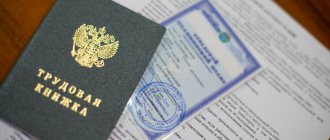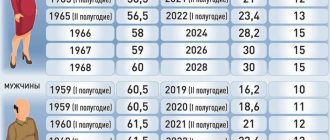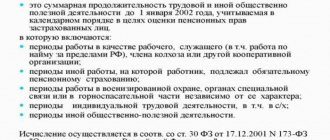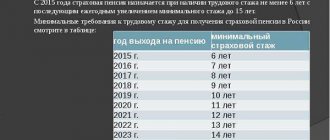People who devote their lives to serving the law and its implementation have a special privileged status. Judges are given respect and honor by society and the state. Therefore, many people think that the pension payments of a retired judge will differ greatly from those of an ordinary citizen. But this is not true, they do not have any special pension. They, like everyone else, are accrued labor pension benefits. However, there is a difference in the amount of payments, which are indeed several times greater than for other pensioners.
Types of payments for retired judges
Citizens of the Russian Federation who have at least twenty years of legal experience, which were spent in the following positions, can receive pension benefits:
- arbitrator or judge, regardless of category;
- prosecutor, lawyer, their deputies and assistants (or any other profession requiring specialized legal education);
- judicial authorities, any position related to legal proceedings.
A judge who has retired or changed positions, starting at age 55 (50 for women), can apply for one of three types of payments:
- Standard insurance pension paid to Russian citizens on a general basis.
- Longevity security (Law 4468-I).
- Lifetime maintenance (Law 3132-I).
The insurance pension is calculated in accordance with payments deducted monthly from the judge’s salary to the Pension Fund. Despite the fact that the final amount is noticeably higher than the national average, this type of judge’s pension is the smallest, so you should only apply for it if you do not have enough experience for the second and third options. A judge who has worked for less than 10 years in the legal field is not entitled to a specialized pension.
With 25 years of service, a judge has the right to immediate retirement based on length of service , even if retirement age has not yet been reached. In contrast to the third point with monetary allowance, payment of salary based on length of service is carried out according to Law No. 4468-I, common to all employees of law enforcement agencies. Article 14 states that a pensioner has the right to receive benefits from 50 to 85% of salary depending on length of service (50% after 20 years, then an additional 3 percent for each subsequent year).
Upon reaching 20 years of experience, a lawyer has the right to choose a monthly lifetime allowance amounting to 80 to 85% of the earnings of an active judge in a similar position. The size of the percentage depends on the length of service - for each additional year one percent is added. The option of lifelong maintenance is described in the specialized law 3132-I on the status of judges.
Support for judges of the Constitutional Court is stipulated by a separate government decree number 425
Also, Resolution No. 425 describes the procedure for payments to dependents and family members of a deceased (or deceased) judge, if at the time of death he has not yet resigned.
Additional material support
In addition to the basic pension or lifelong salary, a judge can receive payments in the presence of state awards. Article 1 No. 21-FZ defines the following categories of persons who are entitled to additional security:
- Heroes of the USSR and Russia;
- awarded the orders of St. Andrew the First-Called, Glory, Lenin, “For Services to the Fatherland”, “For Service to the Motherland”;
- winners of state awards of the USSR and the Russian Federation;
- champions of the Olympic and Paralympic Games.
The amount of payments is indicated in the second article of the same law and ranges from 250 to 415 percent of the all-Russian social pension.
Lifetime pension amount
Like most civil servants, judges' salaries are quite low: the head of the Constitutional Court receives just over 30 thousand rubles monthly. At the same time, a system of incentives and modifiers works: for a working judge, the bonus only for the qualification class ranges from 30 to 150%.
Table of qualification classes of judges
Most bonuses received while in service are not included in the regular pension. In the case of pension benefits, the amount of payments will be affected by:
- length of service (as indicated above - from 80 to 85%);
- the title of professor or associate professor, as well as Honored Lawyer of the country;
- candidate and doctoral degrees;
- knowledge and use of foreign languages in international affairs (up to 20% for judges of the Constitutional Court).
Important! Judges' pensions are not taxed, which is another feature of these payments.
Table. Judge's salary depending on length of service
| Length of service | Percentage increase |
| From 24 to 60 months | 15% |
| From 60 to 120 months | 25% |
| From 120 to 180 months | 30% |
| From 180 to 240 months | 40% |
| More than 240 months | 50% |
*The term bonus is not cumulative and is calculated from the starting salary.
Since 2012, a judge’s work experience includes military service, training in a specialty, and service in government departments. The general “legal” experience includes work in law firms, investigative and prosecutorial bodies, and private practice.
Scientific degrees and titles also provide a percentage increase. A candidate or associate professor will receive 5% of the salary standard, all others will receive 10%. A regional coefficient is also considered: working in the Far North or the Far North of the country will be noticeably more profitable both in terms of accrued length of service and in terms of total salary (standard modifier x1.5).
In practice, even a low class judge with sufficient length of service gives the right to earn 70-80 thousand rubles. Payments are made directly from the federal budget; the regional administration can only pay additionally to all judges at the same time, setting increased coefficients.
Calculation of a judge's pension
When applying for a pension, the judge chooses one of three options. It is not permitted to receive multiple state pension options at the same time. The easiest way to show the practice of calculation is with specific examples.
Judges can choose between three types of pensions
Let's start with the general civil insurance pension. The formula for it looks like this: individual coefficient * point value + (fixed payment * increase coefficient). Let’s say a judge receives a monthly salary of 70 thousand rubles. Under pension legislation and modifiers adopted in 2021, this gives about 8.25 pension points annually. At the current value of a pension point of 87.24 rubles for 20 years of service, the total amount of payments will be 81.5 * 8.25 * 20 = 14394.6 rubles + 5334 rubles of fixed payment. In total, the judge will receive 19,728.6 rubles monthly.
When applying for a long-service pension, the judge’s salary is multiplied by a percentage coefficient, which depends on the legal experience. Here the calculation is much simpler: after a judge reaches 20 years of service, his pension will be 50% of his salary, and each year worked will add another three percent on top to a limit of 85%. With 20 years of service and 70 thousand salary, the judge will receive a pension of 35 thousand, with 25 years - 48,750 rubles (65% of the salary), with 30 years or more - 63,750 rubles (80% of the salary).
Finally, a lifetime allowance will give 56 thousand income under the same starting conditions, since the countdown starts not from 50, but from 80%. With 25 years of service, the pension will also reach its limit of 63,750 rubles.
Calculator for calculating the lifetime allowance of a judge
The calculator below will help you calculate your judge's lifetime allowance.
Go to calculations
How to apply for a pension?
Receipt of funds from the federal budget is carried out at the request of the judicial department or regional administration. To arrange maintenance, the easiest way for a judge is to contact the place of previous work: it is the courts that decide the issue of accrual; the Pension Fund is not involved in the matter. The former judge must provide a set of documents:
- Handwritten content statement.
- Identity card (general civil or service passport of the Russian Federation).
- Work book confirming the declared length of service.
- SNILS card.
- Confirmation of qualification level.
- Certificates or evidence of regalia providing additional benefits.
The review takes two working weeks, after which the applicant is notified of the decision. Payments are made starting from the next calendar month after registration of the application.
Summarizing the above, we can highlight a number of features of the formation of pensions for judges and other court employees:
- payments apply to judges with significant length of service;
- the lifelong maintenance provided in the worst case is 4/5 of the salary, and is not taxed;
- the issue of payments is decided by the judicial panel; the Pension Fund does not participate in the discussion.
An important nuance: when receiving a pension, a judge does not have the right to continue practicing law, and officially returning to work will lead to a freeze in payments. The law has three exceptions in this regard: literature, science and teaching.
Registration procedure
The reason for assigning lifelong maintenance is a written application, regardless of the time of submission.
It expresses a desire to receive appropriate conclusions and notes the lack of income that does not allow the payment of this maintenance to be issued. The application is submitted to the office of the Judicial Department in the region of work, as well as at the place of last work.
The review is carried out by a regular commission, which includes judges, representatives of accounting and personnel services. The validity of the application is verified within 10 days, after which a decision is made on the assignment of payments and their amount.
Judges of arbitration courts submit such applications, as a rule, at their place of work. The work of the reviewing commission is regulated by the chairman of the court. After 10 days, he makes a decision on the assignment of maintenance, which comes into force within 5 days.
Provision of military judges
Retired judges who worked in military courts receive exactly the same subsidies from the federal budget as civilian specialists. Both the age of exit and the amount of compensation, as well as other criteria, coincide. The exception will be the basic length of service - for the military, the minimum period will be 15 years.
To qualify for a long-service pension, military judges must work less than civilians - 15 years
Retired military judges receive additional benefits for injuries sustained as a result of their service. For example, lifetime maintenance can be received along with disability benefits if the judge becomes disabled due to a military injury. This often happens to lawyers who worked in hot spots in their youth. Also, disabled military judges are entitled to increased benefits.
Termination of software assignment
In some cases, they may stop issuing software. This is due to the following reasons:
- Coming out of retirement.
- Violation of the conditions for the provision of PSS, namely due to the circumstances due to which the resignation was terminated.
- Moving to a new place of residence abroad, where there is no agreement between the Russian Federation and another state on the payment of benefits.
- In case of death.
- When applying for a new job. If the money has already been issued after the start of activity, then the former judge is obliged to compensate the state for the funds spent, etc.
Thus, software can reach 70,000–80,000 rubles. Along with it, a number of intangible benefits are provided, including a subsidy for utility bills, extraordinary medical care, free travel, etc. Judges also receive vouchers to sanatoriums for health improvement.
Denial of lifelong maintenance
Each application submitted for lifelong pension provision is considered by a judicial panel in a special manner. To refuse to issue funds to a judge who has worked for more than 20 years, the grounds must be truly significant.
- Any crime, regardless of length of service, deprives the right to work in the judiciary and leads to an automatic denial of lifelong support. The same applies to crimes committed after retirement.
- A change of citizenship is also grounds for refusal or withdrawal of benefits. The law clearly states that a citizen of the Russian Federation can receive maintenance.
- Judges who have been recalled in accordance with current legislation may also be deprived of their salaries. Here, both the reasons for the recall and the consequences of the actions that caused it play an important role.
Sometimes the denial of support is caused by a disagreement with issues in the length of service: private practice or work in a law office may, for various reasons, not be counted as legal experience. In this case, the issue is resolved either at a meeting of the board or in court.
Reviews
In their comments, retired judges write that payments to them are made from funds taken from the federal budget. The application is processed by the Judicial Department of the subject within the established time frame. The act includes all recipients of payments in the relevant territory. A similar procedure is established for all arbitration judges.
Payment to former judges on pension benefits begins immediately following the termination of their pension. Transfers of funds during the period of temporary performance of duties, as a rule, are not suspended.
The frequency of receiving finance, according to the stories of this category of pensioners, is once a month (on the days when salaries are paid). It is possible to transfer funds by mail or home delivery.
https://www.youtube.com/watch?v=y9LLW4ASbsA
Thus, the type of payment received directly depends on the length of service, and, in addition, on the citizen’s other places of work. If it is possible for judges to formalize maintenance for life, the amount obtained is almost or not at all inferior to the salary of an official employee with the corresponding status during the period of work.










